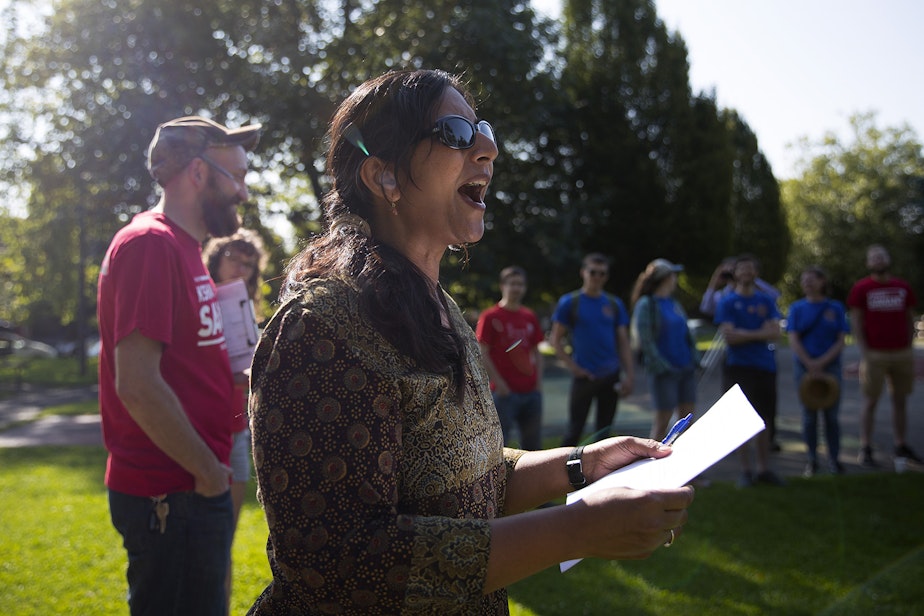Sawant Recall Election in Seattle is about more than those 3 charges

The November elections are over, but there’s still a political battle brewing in one district, where the only socialist Seattle City Council member, Kshama Sawant, is the target of a December 7 Recall Election.
Technically, it’s a contest over three formal charges that Sawant broke the law, but for many voters in District 3, which includes Capitol Hill and the Central Area, it’s a referendum on Sawant’s politics and her political style.
Recall manager Henry Bridger said the election is “only about the charges.”
“I don't like that politicians manipulate the system and violate the laws that they're supposed to uphold,” he said.
RELATED: What to know about the Sawant recall effort
But at a recent Capitol Hill farmers market, most voters, including Johathan Ehrich, couldn’t remember any of the specific charges. He was clear on why he opposed the recall.
“It’s good to have a very strong left-wing voice, and with the Council moving further to the right after the general election, it's more important than ever to make sure we're shoring up the left and doing what we can to protect Seattle's most vulnerable people,” Ehrich said.
Sponsored
In contrast, Tha Chhay said he voted for mayor-elect Bruce Harrell in the November election to help nudge the city further to the center on issues like public safety and homelessness, and now he's voting to recall Sawant.
“I understand she tries to help folks, but I think she goes too far left,” he said.
Sawant is proudly on the left as a leading member of a Trotskyist political party called Socialist Alternative, which sees her role in Seattle city politics as part of a much larger revolutionary struggle to end capitalism.
Those same politics inform Sawant's take on November election results in Seattle that went against progressive candidates like Council President Lorena González. Sawant said that’s not because voters wanted to move more towards the center on issues like homelessness or public safety, but because the progressive candidates were too timid in fighting for their principles.
Sponsored
In this election, Sawant said the “ruling class” is against her because she’s an uncompromising fighter on the issues including raising the minimum wage and rent control, and due to her support for Black Lives Matter.
Sponsored
In fact, two of the formal charges in the recall are related to incidents that occurred at the height of the Black Lives Matter protest movement two summers ago.
In one, Sawant is accused of leading a march to Mayor Jenny Durkan's home.
As a former US Attorney, Durkan's address is protected information under the state’s “Address Confidentiality Program.” The first-in-the-nation law was originally passed in 1991 to protect people who were targets of things like stalking or domestic violence, but it was later expanded to protect criminal justice employees like former assistant US attorney for western Washington Thomas Wales. Wales was shot to death at his home address in Seattle back in 2001.
For her part, Sawant said that she was only invited to speak at the rally, where the organizers included family members of people who have been killed by Seattle police. She accepted that invitation “in solidarity,” but didn’t organize it, and says she didn’t know (and still doesn’t know) the mayor’s address.
Sawant is also charged with letting hundreds of protesters inside city hall after hours during a pandemic. Sawant said she broke no law, and that’s what Seattle police said at the time.
Sponsored
That protest began on June 9. Sawant led a group of marchers away from Capitol Hill and into City Hall where the chants focused on protestor demands like defunding the police. But when Sawant was done speaking, she reportedly led protestors in a different sort of chant about taxing Amazon.
According to some media reports at the time, including in the South Seattle Emerald, some protestors accused Sawant of trying to hijack the BLM movement for her own political ends. Sawant called those reports “exaggerated,” and said the Tax Amazon movement is linked to the Black Lives Matter Movement.
“Housing affordability and raising progressive revenues to fund social housing is very much linked to the needs of the black community,” she said.
Another charge is that Sawant used city resources for a “Tax Amazon” ballot initiative campaign. Sawant said she’s already paid the fine. She also noted that other council members have also violated those campaign ethics rules without being recalled.
In some other states, like California, anyone can bring a recall purely for political reasons, but here in Washington recalls first must get past the courts. In this instance, the State Supreme Court ruled only that there is enough evidence that Sawant broke the law for the recall to go ahead.
Sponsored
It’s now up to residents in District 3, which includes Capitol Hill and the Central area, to cast their votes.




